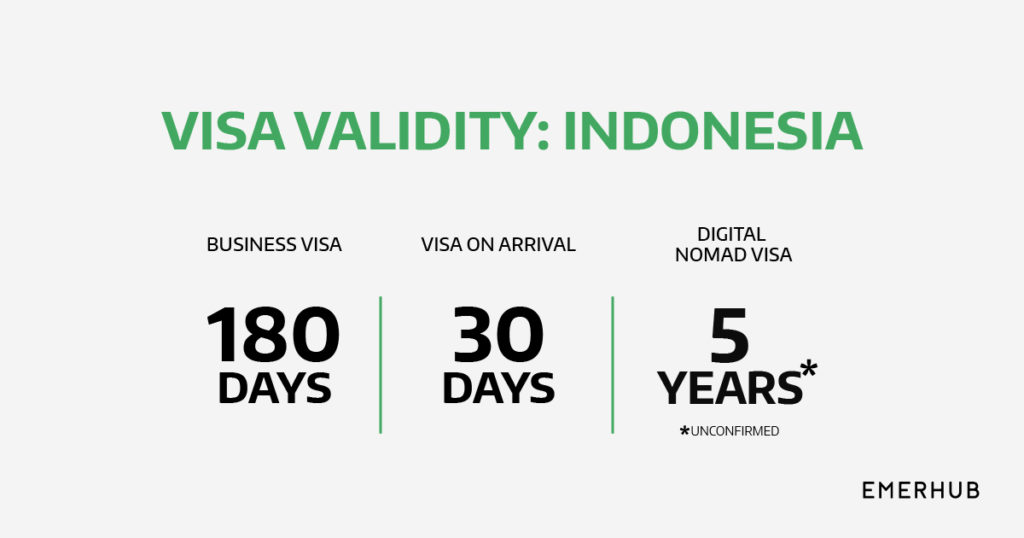Table of contents
For a long time, digital nomads have been flocking to Indonesia, particularly Bali. Because of its coastline, vibrant culture, and good standard of living, Indonesia is a top location for freelance workers contemplating temporary or permanent relocation.
The Indonesian government is said to be launching a special Digital Nomad Visa in an effort to entice more overseas employees to the country. The strategy, which was launched in 2021, was put on hold due to the pandemic’s increasing prevalence. Sandiaga Uno, Indonesia’s minister of tourism and creative economy, indicated in June 2022 that the government is back on track to form a distinct visa for admission.
Indonesia, ASEAN’s largest economy, has relaxed most restrictions for international tourists, and the government anticipates up to 3.6 million foreign visitors this year. Prior to the pandemic, the country saw an upsurge in foreign visitor arrivals from eight million in 2012 to 16 million in 2019, with 6 million arriving in Bali.
The government wants the tourist industry to contribute up to 8% of GDP, up from 4% currently. A worthy goal, implying that Indonesia would need to attract almost 20 million visitors.
According to forecasts, the new digital nomad visa will dramatically boost the eligibility of freelancers and remote workers to live and work in the country. While various media sources have claimed that this visa will become legislation, there has been no confirmation from the Indonesian government on when this will materialize or what the actual provisions of the visa will be.
What is the Digital Nomad Visa?
A digital nomad visa enables remote workers to temporarily stay in another country. The applicant must work remotely for a firm, client, or own a business outside of the nation where a digital nomad visa is sought. It is essential to understand that a digital nomad visa does not allow the holder to look for work in that country.
Holders will be able to stay for five years tax-free if they can prove their income is earned outside of Indonesia. If accepted, the nomad visa will be one of the world’s longest, with other countries only allowing digital nomads up to 90 days.
What differentiates the Digital Nomad Visa from a Business Visa or a Visa on Arrival (VoA)?

Business visas for Indonesia are special travel documents that allow business travelers to visit the country for business purposes. Business visas in Indonesia differ depending on the visitor’s specific requirements. A single-entry business visa allows travelers to stay in Indonesia for up to 180 days for business purposes, with an initial validity of 60 days that can be extended three times. Furthermore, the business visa holder must be sponsored by an Indonesian company. On the other hand, Indonesia provides a Visa on Arrival with a validity of 30 days, which can be extended for another 30 days.
Meanwhile, the Indonesia special nomad visa would allow you to reside in the country for five years. If proposals for the Indonesia digital nomad visa go as planned, the special nomad visa will allow one of the world’s longest stay durations.
Holders of the Digital Nomad Visa may be granted tax-free status. This means they will not be obligated to file any taxes in Indonesia as long as they can prove the revenue was earned outside of Indonesia. This features distinguishing the digital nomad visa visa from KITAS and KITAP.
Possible Requirements for a Digital Nomad Visa
While the government is still developing the digital nomad visa, the details are unclear. Here are a few speculations you might want to know regarding the digital nomad visa’s requirements;
- Current Passport – Your passport must be valid when applying for a visa.
- Work remotely – It is required to be employed by or freelance for organizations outside Indonesia.
A particular requirement, such as an income requirement, may be set as the situation develops. This article will be updated as soon as the Indonesian government publishes the official digital nomad regulations.
Conclusion
Bali truly is a picture-perfect paradise, with its pristine beaches, candy-colored sunsets, mild climate, deep vegetation, and colorful traditions. Bali is already a popular remote worker destination. However, current visa requirements do not allow for extended stays. The digital nomad visa was still not available in Indonesia as of today. If there is an update, Emerhub will be the first to notify you.
In the meantime, digital nomads can continue to apply for KITAS and KITAP, which will enable people to work from Indonesia for an extended period of time in one of the most beautiful places on the planet. Emerhub assists thousands of people from all around the world in obtaining an official permit to enter Indonesia, particularly Bali, for business and leisure. Contact us to find out more about what we can do for your future in Indonesia.







